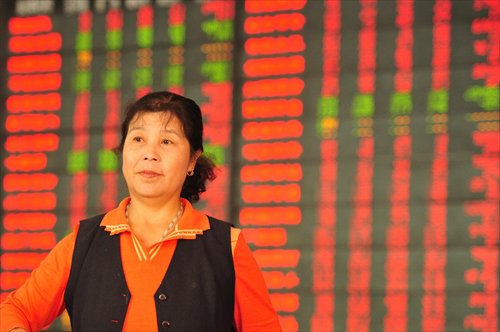Stock volatility has little impact on China's economy
Yuan will not depreciate further, economy shows positive signs

An investor keeps her eye on stock performances in a brokerage in Fuyang, East China's Anhui Province on Friday. Photo: CFP
China's stock market has undergone several corrections since June, and the adjustment has largely run its course, an official from China's central bank told the IMF this weekend.
The volatility of the stock market appears to have had a limited impact on China's real economy, Yi Gang, deputy governor of the People's Bank of China (PBC), was quoted as saying in a statement presented to the IMF Saturday. Yi's statement noted that Chinese financial institutions are generally well-capitalized and that equity financing has not been a significant source of funding for China's corporate sector, which is primarily financed by bank credit and bond issuance.
After the plunge that saw benchmark indexes more than halved began in June, China's stock market entered a phase of self-recovery, Li Daxiao, chief economist at Yingda Securities, told the Global Times Sunday. "The market began to show signs of stabilization as blue chip stocks started to resist market turbulence," said Li.
Li noted that the central government's range of supportive measures to prevent systemic risks has proven effective. He specifically pointed to "policy measures aimed at not only ensuring ample liquidity for securities companies but also powerful market supervision," noting that the stock market is back on a positive track after its recent ups and downs.
In the PBC's statement, deputy governor Yi noted that the reform of the yuan exchange rate mechanism aims to make the yuan more market-oriented and that the depreciation of the yuan aligned the exchange rate more closely with market conditions.
On August 11, the central bank devalued the yuan by about 2 percent against the US dollar, the biggest one-day currency devaluation in nearly two decades. The yuan weakened by about 3 percent over the following two days before stabilizing after increased assurance from the central bank.
Despite worries that the yuan may slide further in the near future, Yi noted in the statement that persistent depreciation of the yuan would be inconsistent with the country's fundamental economic performance.
"We don't estimate that the yuan will slide further in the near future, as prolonged currency depreciation would in fact hurt trade activity," Liu Yaxin, macro strategist at China Merchants Securities, told the Global Times.
Liu noted that a weaker yuan is usually seen as a factor that improves the country's export competitiveness. "However, an abrupt and sizable yuan depreciation is going to trigger a currency war and force foreign investors to pull investments out of the country, which is unlikely to be the central bank's intention," Liu said.
The statement of the central bank's deputy governor also noted that the yuan will not depreciate further because China's economy continues to grow at a robust pace, and its economic fundamentals remain strong. The statement also reported that the still-large trade surplus offers strong support to the yuan exchange rate.
Yi noted that the Chinese economy will become more balanced and sustainable as wide-ranging structural reforms are carried out.
Ding Zhijie, professor of economics at the University of International Business and Economics in Beijing, told the Global Times that the continuing process of economic restructuring has made progress. "The country has been focusing on high-end manufacturing while curbing the industrial overcapacity issue," Ding said, noting that initiatives such as Internet Plus and Made in China 2025 will help upgrade industries and offer them a competitive edge.
Despite downward pressure, China's economic prospects remain positive, Ding noted. "The public needs to be more confident about the country's economic transformation," he said.
Regarding the IMF's Special Drawing Rights (SDR) review, PBC deputy governor Yi noted that China will improve data transparency while developing more representative interest and exchange rates for the yuan.
According to the statement, the yuan is also expected to meet requirements for inclusion in the SDR basket after the implementation of supportive measures that include making China's interbank bond and foreign exchange markets accessible to foreign central banks.